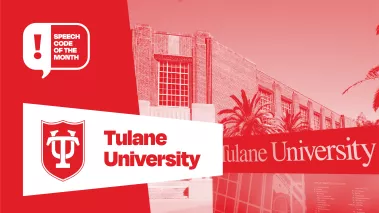Table of Contents
Tulane’s ban on ‘rude’ messages earns FIRE’s lowest speech code rating

zimmytws / Shutterstock.com
Tulane University ranked 238 out of 248 schools in FIRE’s 2024 College Free Speech Rankings. If a student were to use university WiFi to tweet their frustration about that, they could face punishment — including expulsion — under the school’s acceptable use policy. Beginning to realize why Tulane’s ranking is so low?
That’s right: Bad speech codes contribute to a school’s score in the rankings, and this policy is the sole reason the university earns FIRE’s worst, “red light” rating.
Tulane’s acceptable use policy states that students, faculty, and staff must agree “to communicate only in ways that are kind and respectful” when using university computing, networking and communications resources. So, if a university administrator thinks a tweet a student sent about Tulane’s speech climate is unkind or disrespectful, that student could be subject to punishment.
Students shouldn’t have to self-censor knowing this policy hangs over their heads. Tulane should consider its poor ranking a wakeup call.
The policy also says users agree not to create material that violates the university’s code of conduct, “such as messages that are pornographic, threatening, rude, discriminatory, or meant to harass.”
There are several problems there.
It’s fine to note that conduct that occurs online is subject to the student code of conduct. However, this language indicates that any conduct subjectively deemed pornographic, rude, or merely meant to harass — rather than conduct that actually constitutes harassment — violates that code and is off-limits.

2024 College Free Speech Rankings
College Free Speech Rankings
For the fourth year in a row, FIRE and College Pulse surveyed college students about their perceptions and experiences regarding free speech on their campuses.
You don’t have to be a First Amendment scholar to imagine how much protected speech falls under those bans. Faculty and students who read this policy are left to assume that any online speech disfavored by the institution could lead to punishment. And the punishment can be steep, including the possibility of “expulsion or termination.” This all adds up to a bad environment for expression.
Students shouldn’t have to self-censor knowing this policy hangs over their heads. Tulane should consider its poor ranking a wakeup call. It’s time for Tulane to foster a better environment for free speech by teaching students about the importance of this fundamental principle, backing up its students and faculty when they’re under fire over their expression, and shoring up written regulations on expression so they align with the commitments to free speech it maintains elsewhere in official policy.
Committed to “creating and protecting an environment in which a variety of ideas can be freely expressed … ?” Let’s see that commitment in action.
FIRE stands ready to assist the administration with these steps whenever it’s ready to take them.
Recent Articles
FIRE’s award-winning Newsdesk covers the free speech news you need to stay informed.

FIRE statement on immigration judge’s ruling that deportation of Mahmoud Khalil can proceed

FIRE comment to FCC calls for review of regulations that may violate the First Amendment

FIRE welcomes Allison Hayward to board of directors


